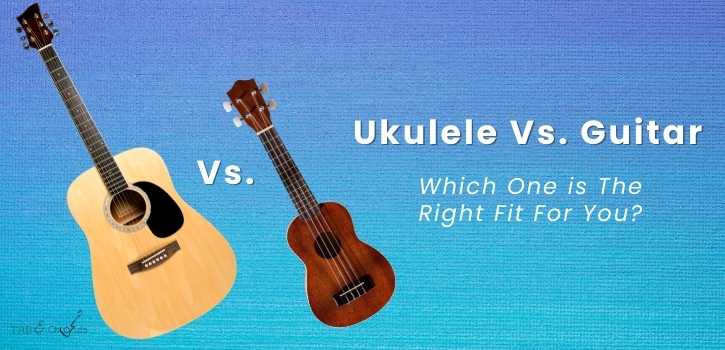Ukulele Vs. Guitar: Which One is The Right Fit For You?
Learning to play any musical instrument requires a considerable amount of effort on the student’s part both in terms of the time invested and the funds. Anyone confused regarding whether to go for a ukulele or a guitar should do an ample amount of research first so as to go for the option that matches their needs in the best way.
Most people consider the ukulele an easier-to-learn instrument than a guitar, so they take it as a starting point to transition to guitar later on. That is true to some extent as both are stringed instruments and share the same attributes. However, the ukulele has a very limited range as compared to a guitar. Also, both the instruments are tuned differently and produce different sounds. As a beginner who’s torn between learning to play the ukulele and the guitar, it is important to consider the similarities and the dissimilarities between the two to give you a better understanding of what each of the two entails and which one is actually your best bet.
Origin
The origin of stringed instruments can be traced back to the early times when it was discovered that sounds could be produced by attaching strings to hollow gourds. This paved the way for the modern guitar. Today stringed musical instruments are an important aspect of almost all sorts of musical genres, especially guitars.
Guitars have been a big part of popular culture for quite some time now, with the ukulele bursting into the scene only recently. However, it does not mean that ukuleles are any less popular, given the fact that in recent times relevant music is written keeping ukuleles in mind.
When it comes to the origin of the ukulele, it is most commonly thought of as an instrument that originated from Hawaii, but that does not seem to be the case. Ukulele in Hawaiian is translated to “the gift that came here” and was first introduced to the island by Portuguese immigrants back in the 1880s.
| Ukulele(Uke) | Acoustic Guitar | |
| Difficulty Level | Easier to hold chords, fret notes due to low string tension | Harder on the fingers, difficult to hold chords due to more strings |
| Tone | Warm and sweet | Bright and full |
| Size | Small | At least twice that of an ukulele |
| Scale length(from nut to bridge) | 13-19 inches | More than 20 inches |
| Strings | Gut, fluorocarbon, nylon | Steel (Nylon for classical guitars) |
| Versatility | Limited tone and range | Used in all kinds of musical genres |
| Maintenance | Low | Greater susceptibility to weather changes and needs more maintenance |
| Cost | Inexpensive | Medium to very high |
Similarities
- Stringed instruments
The biggest and the most obvious similarity between the ukulele and guitar is that both are stringed musical instruments and work under the same principle of natural amplification. This means that both the ukulele and guitar are able to produce sounds by strumming strings covering a hollow wooden body. When the strings are strummed, the sound resonates within the hollow part of the ukulele and guitar, projected out. Of course, this only applies to ukuleles and acoustic-type guitars because electric guitars depend on electric amplifiers instead.
- Method of playing
Another similarity between the two is that both are played in the same way; that is, both come with strings on the neck part, which are then separated by frets or metal lines. Strumming the strings on the hollow part of both the instruments while pressing on a fret will produce a note. Different combinations of frets will produce sounds of different scales depending on whether the notes are played together or one by one.
- Portable
Unlike musical instruments such as drums and piano, ukuleles and guitars are very easy to carry along with you. Therefore, they are perfect and convenient for live performances, musical shows, etc.
Dissimilarities
There are some big dissimilarities between the ukulele and guitar and the similarities. If you have been wondering which instrument is best for you, this section might just help you pick the best one. Compared to a guitar, the ukulele is a much easier instrument to learn, especially for beginners, and here are the reasons as to why.
- Strings
Compared to a guitar’s nickel-plated or steel strings, the ukulele’s strings are made of nylon which is easier to work with for kids and beginners. The guitar has more strings at six as compared to the ukulele, which comes with four strings. The two extra strings in the guitar are for more sound and scale variations. The ukulele’s 4 strings prove to be a big limitation in this regard. The difference can also be seen in terms of the number of frets that each instrument has; most guitars come with 18 frets, while the ukulele has just 12 frets.
- Size
When it comes to size, it is obvious that the ukulele is more compact than a guitar. If you are someone that is always on the go carrying a guitar on your back can be a cumbersome task; in that case, the ukulele is the best option since it is half the size of a guitar and so can be easily handled.
- Sound
When they are played simultaneously, both the ukulele and guitar sound very different from each other. The guitar can produce a loud and deep sound while the ukulele sounds soft and less loud. This is mainly because of their size difference and string tension.
- Tension
The strings on the ukulele are low tension, meaning they are stretchable. While on the other side, the strings on a guitar are high tension because they are comparatively tighter. This is why playing the ukulele feels more comfortable as compared to a guitar, and there is also less risk of your fingers getting hurt while playing the ukulele, unlike a guitar.
- Tuning
Ukuleles are tuned differently than guitars. The strings on the guitar go from low to high, while the highest string on the ukulele is placed at the bottom, where the lowest string of a guitar is positioned. As a result, the string names on the ukulele read G-C-E-A as compared to a guitar that goes E-A-D-G-B-E.
- Price
If you are a beginner, learning to play the ukulele is a lot easier than a guitar. Along with that, ukuleles also cost a lot less. You can easily find a good quality ukulele in the $50 to $100 price range, while for a guitar of the same quality, you might have to pay $150 or more. Based on the reasons listed above, it might sound like the guitar might be a little difficult for a beginner as compared to the ukulele. However, both the instruments are an excellent choice for anyone who is a serious learner. Also, learning either of the instruments can provide you with the required skills and knowledge to learn the other one more easily. For kids, given the size and ease of playing, the ukulele is more suitable, while for someone that is looking for a versatile instrument with a broader range, the guitar is their best bet.
Support Us.


